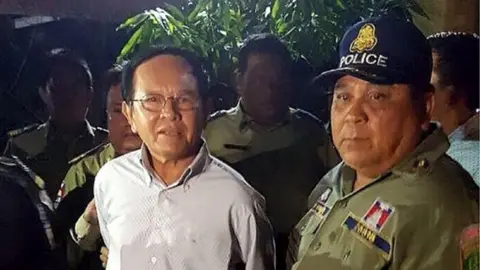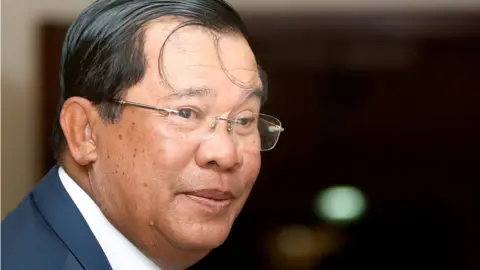Treason charge for Cambodian opposition leader accused of US plot
 AFP/Getty Images
AFP/Getty ImagesA Cambodian court has charged the opposition leader with treason, amid concerns over the country's increasingly authoritarian rule.
Kem Sokha has been accused of colluding with the US to conspire against the Cambodian government. If found guilty, he faces up to 30 years in jail.
Kem Sokha's arrest on Sunday was the latest in a series of moves seen as clamping down on critics and the press.
It comes ahead of a general election due next year in Cambodia.
Kem Sokha's Cambodia National Rescue Party was seen as a contender to the ruling party led by strongman Hun Sen, who has been in power for more than 30 years.
A court statement on Tuesday stated that he was involved in "a secret plan" and "activities of conspiracy" with foreigners "which causes chaos and affects the kingdom of Cambodia", reported The Phnom Penh Post.
The opposition leader and lawmaker, who was arrested despite having parliamentary immunity, had reportedly appeared in a 2013 video telling supporters that he received US support and advice for political strategy.
His lawyer, Pheng Heng, denied this was a crime, telling Reuters news agency: "His words are educational in a workshop... What he talked about was elections in a multi-party democratic way."
The UN's human rights high commissioner, Zeid Ra'ad Al Hussein, said he was "seriously concerned" about Kem Sokha's arrest, which was carried out "with no respect for due process guarantees, including respect for (Kem Sokha's) parliamentary immunity".
He added that the arrest was "all the more worrying" given recent government measures.
Authorities have recently launched tax and regulatory probes into rights groups and media companies, in moves which critics say are aimed at silencing opponents.
A foreign non-profit group which investigated election irregularities was ordered to leave last month, while independent newspaper The Cambodia Daily was forced to shut down this week.

Growing pressure on the media
by Kevin Ponniah, BBC News
 Reuters
ReutersAside from the Cambodia Daily, other independent media outlets - including the US government-funded Radio Free Asia and Voice of America - have also reportedly been accused of not complying with tax obligations.
These outlets, and the Phnom Penh Post, a newspaper which so far has not faced similar accusations, frequently report on topics that embarrass the government, from illegal logging to corruption and human rights abuses.
The Cambodian government denies the cases are political and points to the considerable freedom critical journalists have in the country, which it says is a democracy.

